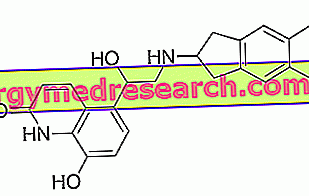Definition
Among the most formidable malignant neoplasms, pancreatic cancer unfortunately plays a leading role: when pancreatic cells undergo an alteration, they tend to proliferate very quickly, both in the organ and in the organism, causing their death in the vast majority of cases. However, pancreatic cancer is not widespread, as are colon cancer or cervical cancer.
Causes
Some scholars speak of "multifactorial aetiology", others believe that pancreatic cancer is not due to a precise cause: many unknowns, only unresolved questions. However, it seems that the association of more elements can contribute to exponentially increase the probability of pancreatic cancer: alcohol abuse, high fat diet, exposure to carcinogens, obesity, genetic predisposition and smoking.
Symptoms
Pancreatic cancer is a subtle and subtle disease: not only is it an almost incurable neoplasm, but it is difficult to diagnose, given that it does not begin with any truly distinguishable symptom. Only many vague and non-specific signs in the initial phase: ascites, difficulty in digestion, abdominal pain, loss of appetite, jaundice, nausea, weight loss, vomiting.
- Possible complications (advanced stage): diabetes, the result of the inability of pancreatic beta cells to produce insulin, death.
Information on Pancreatic Cancer - Pancreatic Cancer Treatment Drugs is not intended to replace the direct relationship between health professional and patient. Always consult your doctor and / or specialist before taking Pancreatic Cancer - Pancreatic Cancer Treatment Drugs.
drugs
Pancreatic cancer treatment drugs are only useful for relieving symptoms and prolonging a patient's life expectancy.
It is almost paradoxical: although surgery is the only effective therapeutic option, it is almost impossible to remove the entire organ, thus ensuring a definitive block of malignant cell proliferation. As far as pancreatic cancer is concerned, the theory that "cancer is diagnosed faster, the patient is more likely to get a good prognosis" is not always valid: in fact, the diseased pancreatic cells have an impressive regeneration capacity.
The mortality rate is practically the same as the number of pancreatic cancers actually diagnosed → mortality = incidence
Radiotherapy is practically not applicable in case of pancreatic cancer, given the particular location of the organ near anatomical structures that are very sensitive to X-rays.
Exploratory laparotomy is a type of surgical intervention aimed at verifying the expansion of cancer; after which it is possible to proceed with the resection of the spleen and tail of the pancreas, with the eradication of the duodenum, the head of the pancreas and the gallbladder, or with the removal of a larger part of the pancreas, spleen, duodenum and gall bladder . The intervention depends on the stage of the tumor.
Chemotherapy, although feasible, is not a first-choice treatment option: it speaks, in fact, of pancreatic cancer as a chemo-resistant pathology. Some chemotherapy drugs are exclusively useful for palliative purposes.
The following are the classes of anticancer drugs mostly used in palliative therapy against pancreatic cancer, and some examples of pharmacological specialties; it is up to the doctor to choose the most suitable active ingredient and posology for the patient, based on the severity of the disease, the health of the patient and his response to treatment:
- Gemcitabine (eg Gembin, Tabin, Gemzar): the recommended dose for palliative treatment of pancreatic cancer is 1 g / m2 intravenously (30-minute infusion); repeat the administration once a week, for a maximum of 7 weeks, followed by 7 days of rest. Maintenance dose: 1 g / m2 intravenously (30-minute infusion) to be repeated once a week for three weeks, followed by 4 weeks of rest.
- Streptozocina (eg Zanosar): belongs to the class of alkylating agents: the drug is indicated for the palliative treatment of pancreatic islet cell carcinoma, especially in the metastatic stage. Take 500mg / m2 of the drug once a day for 5 consecutive days. Repeat the application every 6 weeks, until the patient benefits without too many toxic side effects.
- 5-fluorouracil (eg Fluorouracil): start therapy against pancreatic cancer with 12 mg / kg intravenously, once a day for 4 consecutive days. Do not exceed 800 mg a day. In the case of non-toxicity, take 6 mg of drug per pound of body weight at the 6th, 8th, 10th and 12th day. For obviously malnourished patients, decrease the initial dose to 6 mg / kg for 3 days (max. 400 mg / day) and continue the administration of 3 mg / kg on the 5th, 7th and 9th day. Stop therapy at the end of the 9th day, even if there are no signs of toxicity. Repeat this method of administration every 30 days; alternatively, administer 10-15 mg / kg per week, as a single dose, without exceeding a gram per week. The dosage must be carefully checked by the doctor and modified if necessary, based on the response of the sick patient.
- Mitomycin (eg. Mitomycin C): the drug is an antimetabolite and antineoplastic, indicated to reduce pain symptoms in case of pancreatic cancer: take 20 mg / m2 intravenously, in a single dose, by catheter. Repeat the dose at 4-8 week intervals.
- Docetaxel (eg Docetaxel Teva Pharma, Docetaxel Teva, Docetaxel Winthrop): this drug is injected by intravenous infusion and, although it is not the first line active ingredient for pancreatic cancer, it is sometimes used to lighten the symptoms. The dosage must be established by the doctor.
Therapeutic perspectives for the treatment of pancreatic cancer
Monoclonal antibodies - such as erlotinib - appear to be beneficial for the treatment of pancreatic cancer:
- Erlotinib (eg Tarceva) the anticancer drug is often used in therapy against pancreatic cancer in combination with gemcitabine. The recommended dose is 100 mg taken orally before meals or two hours later.



